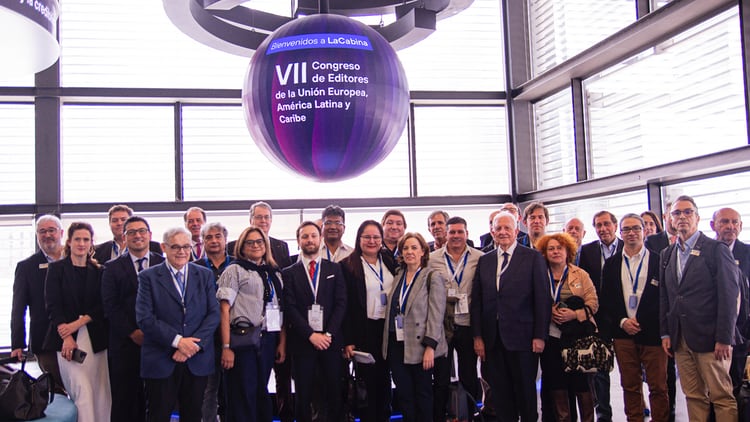The Diplomat
The 7th Congress of Editors of the European Union, Latin America and the Caribbean (EditoRed) concluded yesterday in Brussels with a declaration in which they condemned political pressure against journalists and assured that they would denounce any attempt to coerce journalists, wherever in the world it takes place.
The Congress, which brought together some fifty representatives of European and Latin American media in sessions held in Madrid and Brussels, was held under the slogan: “The quality of information and the credibility of the media, guarantees for democracy”.
In a final declaration, the editors underline their commitment to freedom of information as a fundamental pillar of democracy and urge the protection and promotion of freedom of expression and media independence in all circumstances.
“Political pressure and threats represent significant challenges that must be fought unconditionally, at all times, in all places and under all circumstances,” they say, while expressing their support for those journalists in whose countries political conditions do not allow them to fully exercise their journalistic work.
EditoRed is committed to disseminating the journalistic work of professionals who may see their freedom in the exercise of their work conditioned in their countries, and assures that it will denounce all attempts at coercion and persecution of journalists “wherever and whenever it occurs”.
The declaration also addresses some specific aspects that affect the right to information, such as, for example, the financial difficulties arising from the digital transformation or the emergence of Artificial Intelligence (AI).
Thus, publishers are calling for legal protection from states and international bodies “to make investments profitable, ensure respect and legal income for workers, and independence”.
And with regard to Artificial Intelligence, after alluding to the recent law passed in the European Union, they warn that there has been “serious regulatory negligence“. Specifically, they explain that “although digital news publishers represent the essential prerequisite for the provision of verified AI training content, the European regulator has left them out of the value chain generated by AI systems”. “If such a legal dysfunction is not corrected,” they warn, “AI systems trained on unreliable digital content will amplify the spread of misinformation”.
Publishers point to six key requirements to sustain a diverse European and Latin American media landscape: a clear commitment to copyright, protection of up-to-date content, enforceable remuneration, reversal of the burden of proof and transparency obligations, applicability of European copyright law, and opt-out in text and data mining.
The statement also addresses ethics and responsibility in journalism and disinformation and fake news, stating: “Editors should commit to standards of excellence in fact-checking, fairness in reporting and transparency in correcting errors, in order to counter the proliferation of disinformation and fake news”.
The publishers also state that they seek to ensure that the news they disseminate accurately and fairly reflects the diversity of their audiences and communities and are committed to amplifying and promoting the diversity of voices in the media, including the representation of ethnic, cultural, linguistic and social minorities.
They also commit to “develop efforts to listen to the audience, to understand their new information needs, to know and use in a journalistic way the narrative forms that are closest to them and to engage with the community in projects that seek to provide solutions to the problems that are relevant to them”.
Further on, the declaration expresses its concern about the “enormous difficulties for the free exercise of journalism”, in the context of the Russian invasion of Ukraine, and denounces the conditions in which news professionals work in the Gaza Strip, “which has meant – it recalls – a high number of journalists killed and injured in the exercise of their work, essential for international public opinion to be able to know the reality of the conflict”.
The editors also reject the attacks on freedom of expression and right to information that are being carried out by the public authorities in various European Union and Latin American countries, and point, in particular, to the cases experienced in Nicaragua, Venezuela, Mexico, Cuba and Hungary, while noting that these difficulties for the free exercise of journalism have begun to dissipate in Poland, following the political change that has taken place in the country. They also denounce the growing threat to the profession posed by the narco phenomenon, which has had a particular impact this year in Ecuador.
The statement underlines the importance of ensuring the safety of journalists in conflict zones and high-risk environments. “We call on the authorities, media companies and professional organisations to take concrete measures to ensure the safe exercise of journalistic work and to investigate and punish attacks and threats against journalists,” it reads.
On the other hand, the declaration considers it necessary to collaborate in order to report accurately and responsibly on humanitarian crises, forced displacement and situations of vulnerability, and is committed to promoting, through media content, initiatives that promote literacy, access to education and the construction of fairer and more inclusive societies.
The declaration concludes by pointing out that it is essential to strengthen editorial collaboration, the exchange of resources and the amplification of diverse voices in the media. “The creation of networks of support and cooperation among media, such as EditoRed, strengthens the capacity of publishers to address common challenges and fosters mutual enrichment through regional and global perspectives,” it says.
The Congress
The VII Congress of Media Publishers of the European Union, Latin America and the Caribbean is an event organised by Grupo Prestomedia with the support of EditoRed, the European Commission and the European Parliament, Telefónica, Iberia and the Community of Madrid, as well as the collaboration of the Universidad Rey Juan Carlos, Turismo de Galicia and Casa de América, and with Prensamedia as editorial partner.





